副词用法归纳
副词归纳总结大全

副词归纳总结大全副词是一类用来修饰动词、形容词、其他副词以及整个句子的词语。
通过使用副词,我们可以更准确地描述动作的方式、程度或时间,从而让句子更加丰富生动。
本文将为大家归纳总结常用的副词并进行分类介绍。
一、副词修饰动词1. 副词修饰动作的方式:例如:快速地(表达快速的方式)、小心地(表达小心的方式)2. 副词修饰动作的程度:例如:非常(表达非常的程度)、稍微(表达轻微的程度)3. 副词修饰动作的时间:例如:经常(表达频繁的时间)、偶尔(表达偶尔的时间)二、副词修饰形容词1. 副词修饰形容词的程度:例如:非常聪明(表达非常的程度)、相当漂亮(表达相当的程度)2. 副词修饰形容词的质量:例如:非常高兴(表达高兴的程度)、十分优秀(表达优秀的程度)三、副词修饰其他副词1. 副词修饰副词的程度:例如:非常快速地(表达非常快速的程度)、相当小心地(表达相当小心的程度)2. 副词修饰副词的频率:例如:非常经常地(表达非常经常的频率)、有时偶尔(表达有时偶尔的频率)四、副词修饰整个句子1. 副词修饰句子的程度:例如:确实,这部电影非常好看(表达非常的程度)2. 副词修饰句子的条件:例如:只要努力,你一定能成功(表达条件的程度)3. 副词修饰句子的结果:例如:其实,小明并不喜欢这首歌(表达结果的程度)综上所述,副词在句子中起到了丰富语言表达的作用,通过修饰动词、形容词、其他副词以及整个句子,我们可以更准确地表达动作的方式、程度或时间。
在写作中,合理运用副词可以使文句更加地流畅、准确,让读者更好的理解所表达的意思。
希望本文对您在副词的使用上有所帮助,同时也希望大家能够在写作中更加注重细节,让文章更加生动有趣。
英语副词用法总结

英语副词用法总结副词是一种用来修饰动词、形容词、其他副词、短语或者整个句子的词类。
副词为我们提供了更多的信息来描述或修改其他词或短语的含义。
副词的用法总结如下:1.副词修饰动词:-副词可以用来修饰动词的方式、程度、频率等。
例句:- He ran quickly to catch the bus.- She speaks fluently in English.- They often go hiking on weekends.2.副词修饰形容词或其他副词:-副词可以用来修饰形容词或其他副词,表示程度或方式。
例句:- The weather is extremely hot today.- She sings beautifully.- He drives quite fast.3.副词修饰短语或介词短语:-副词可以用来修饰短语或介词短语,表示方式、程度或时间。
例句:- She walked into the room quietly.- They arrived late for the meeting.- He looked at her lovingly.4.副词修饰整个句子:-副词可以用来修饰整个句子,表示说话者的观点、态度或推测等。
例句:- Frankly, I don't agree with you.- Hopefully, everything will be fine.- Apparently, she didn't receive my message.需要注意的是,副词可以通过在词根后面加上-ly来构成,但并非所有以-ly结尾的词都是副词。
有些以-ly结尾的词是形容词,如friendly、silly等。
当副词修饰动词时,它们通常放在动词之后,但有些情况下它们也可以放在句尾。
副词的位置比较灵活,但需要确保它们与所修饰的词或短语之间的关系明确。
副词用法归纳

副词用法归纳Feb 23, 2011副词的定义: 副词是一种用来修饰动词,形容词,副词或全句的词,说明时间,地点,程度,方式等概念。
一)副词的分类:1) 时间和频度副词:now, then, often, always, usually, early, today, lately, next, last, already, generally, frequently, seldom, ever, never, yet, soon, too, immediately, hardly, finally, shortly, before, ago, sometimes, yesterday.2) 地点副词:here, there, everywhere, anywhere, in, out, inside, outside, above, below, down, back, forward, home, upstairs, downstairs, across, along, round , around, near, off, past, up, away, on.3) 方式副词:carefully, properly, anxiously, suddenly, normally, fast, well, calmly, politely, proudly, softly, warmly4) 程度副词:much, little, very, rather, so, too, still, quite, perfectly, enough, extremely, entirely, almost, slightly.5) 疑问副词:how, when, where, why.6) 关系副词:when, where, why.7) 连接副词:how, when, where, why, whether.二)副词的用法: 副词在句中可作状语,表语,补语。
副词的用法归纳总结
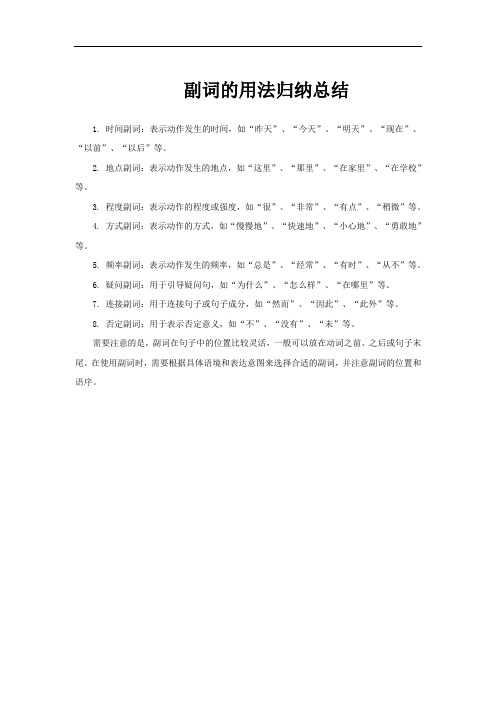
副词的用法归纳总结
1. 时间副词:表示动作发生的时间,如“昨天”、“今天”、“明天”、“现在”、“以前”、“以后”等。
2. 地点副词:表示动作发生的地点,如“这里”、“那里”、“在家里”、“在学校”等。
3. 程度副词:表示动作的程度或强度,如“很”、“非常”、“有点”、“稍微”等。
4. 方式副词:表示动作的方式,如“慢慢地”、“快速地”、“小心地”、“勇敢地”等。
5. 频率副词:表示动作发生的频率,如“总是”、“经常”、“有时”、“从不”等。
6. 疑问副词:用于引导疑问句,如“为什么”、“怎么样”、“在哪里”等。
7. 连接副词:用于连接句子或句子成分,如“然而”、“因此”、“此外”等。
8. 否定副词:用于表示否定意义,如“不”、“没有”、“未”等。
需要注意的是,副词在句子中的位置比较灵活,一般可以放在动词之前、之后或句子末尾。
在使用副词时,需要根据具体语境和表达意图来选择合适的副词,并注意副词的位置和语序。
初中副词的种类与用法归纳
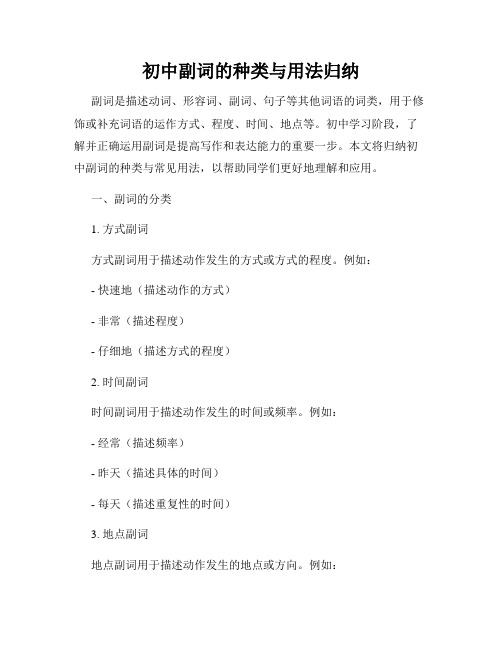
初中副词的种类与用法归纳副词是描述动词、形容词、副词、句子等其他词语的词类,用于修饰或补充词语的运作方式、程度、时间、地点等。
初中学习阶段,了解并正确运用副词是提高写作和表达能力的重要一步。
本文将归纳初中副词的种类与常见用法,以帮助同学们更好地理解和应用。
一、副词的分类1. 方式副词方式副词用于描述动作发生的方式或方式的程度。
例如:- 快速地(描述动作的方式)- 非常(描述程度)- 仔细地(描述方式的程度)2. 时间副词时间副词用于描述动作发生的时间或频率。
例如:- 经常(描述频率)- 昨天(描述具体的时间)- 每天(描述重复性的时间)3. 地点副词地点副词用于描述动作发生的地点或方向。
例如:- 在这里(描述具体的地点)- 向前(描述方向)- 远离(描述相对位置)4. 程度副词程度副词用于描述动词、形容词或副词的程度。
例如:- 很(描述程度)- 最(描述比较级)- 非常(描述非常级)5. 位置副词位置副词用于描述动作发生的位置或方向。
例如:- 上面(描述具体的位置)- 向下(描述方向)- 隔壁(描述相对位置)6. 频率副词频率副词用于描述动作或事件发生的次数。
例如:- 有时(描述偶尔)- 经常(描述频繁)- 从不(描述否定频率)二、副词的用法1. 修饰动词副词可以直接修饰动词,表示动词的方式、程度、时间等。
例如:- 他慢慢地走了过来。
- 她高兴地笑了起来。
- 我们昨天去了公园玩。
2. 修饰形容词副词可以修饰形容词,表示对形容词的程度或强调。
例如:- 这本书非常有趣。
- 这个问题太难了。
- 她非常漂亮。
3. 修饰副词副词可以修饰其他副词,用于强调程度或方式的不同。
例如:- 她非常认真地工作。
- 我们一起快乐地唱歌。
- 他们高兴地跳了起来。
4. 修饰句子副词可以修饰整个句子,表示说话人的态度、观点或者句子所描述的动作发生的情况。
例如:- 幸好,我们按时赶到了。
- 不幸的是,他们迟到了。
- 无论如何,我都会努力完成任务。
高中英语知识点归纳副词用法

高中英语知识点归纳副词用法副词是用来修饰动词、形容词、副词以及整个句子的词语。
在高中英语学习中,副词的用法非常重要。
本文将对高中英语中副词的用法进行归纳总结。
一、副词修饰动词1. 描述方式:- 如:She runs fast.(她跑得快)- 如:He speaks loudly.(他大声说话)2. 描述频率:- 如:They often go hiking.(他们经常去徒步旅行)- 如:I sometimes watch movies. (我有时看电影)3. 描述时间:- 如:She arrived early.(她早到了)- 如:They left late.(他们离开得晚)4. 描述地点:- 如:He lives nearby.(他住在附近)- 如:She went upstairs.(她上楼去了)二、副词修饰形容词和副词1. 描述程度:- 如:The movie is very interesting.(这部电影非常有趣)- 如:He is quite tall.(他相当高)2. 描述方式:- 如:She speaks English fluently.(她流利地说英语)- 如:He solved the math problem correctly.(他正确解答了这个数学题)三、副词修饰整个句子1. 描述时间:- 如:Tomorrow, I will go shopping.(明天,我要去购物)- 如:Unfortunately, it rained all day.(不幸的是,一整天都在下雨)2. 描述地点:- 如:Here, you can find many restaurants.(在这里,你可以找到很多餐馆)- 如:There, I met my old friend.(在那儿,我遇见了我的老朋友)3. 描述原因:- 如:Therefore, we decided to cancel the trip.(因此,我们决定取消这次旅行)- 如:However, she didn't attend the meeting.(然而,她没有参加会议)四、副词的变化形式1. 副词的比较级和最高级:- 如:He works harder than his brother.(他比他兄弟工作更努力) - 如:This is the most beautiful flower in the garden.(这是花园里最美的花)2. 副词的否定形式:- 如:She doesn't often visit her grandparents.(她不常去看望她的祖父母)- 如:He didn't carefully read the instructions.(他没有仔细阅读说明)3. 副词的词性转换:- 如:I want to swim, but it's too cold.(我想游泳,但天气太冷了) - 如:The sound was loud enough to wake him up.(声音足够大,可以把他吵醒)总结:副词在句子中的用法多种多样,能够用来修饰动词、形容词、副词以及整个句子。
高中英语知识点归纳副词短语的用法
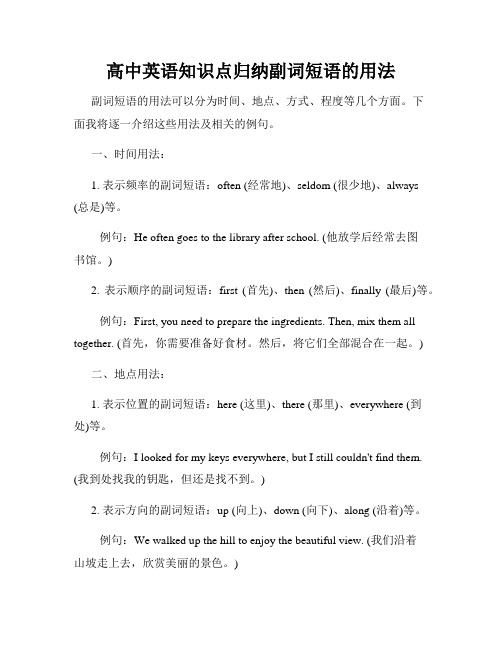
高中英语知识点归纳副词短语的用法副词短语的用法可以分为时间、地点、方式、程度等几个方面。
下面我将逐一介绍这些用法及相关的例句。
一、时间用法:1. 表示频率的副词短语:often (经常地)、seldom (很少地)、always (总是)等。
例句:He often goes to the library after school. (他放学后经常去图书馆。
)2. 表示顺序的副词短语:first (首先)、then (然后)、finally (最后)等。
例句:First, you need to prepare the ingredients. Then, mix them all together. (首先,你需要准备好食材。
然后,将它们全部混合在一起。
)二、地点用法:1. 表示位置的副词短语:here (这里)、there (那里)、everywhere (到处)等。
例句:I looked for my keys everywhere, but I still couldn't find them. (我到处找我的钥匙,但还是找不到。
)2. 表示方向的副词短语:up (向上)、down (向下)、along (沿着)等。
例句:We walked up the hill to enjoy the beautiful view. (我们沿着山坡走上去,欣赏美丽的景色。
)三、方式用法:1. 表示方式的副词短语:carefully (小心地)、quickly (快速地)、quietly (安静地)等。
例句:She spoke quietly so as not to wake the baby. (她小声说话,以免把孩子吵醒。
)2. 表示状态的副词短语:happily (快乐地)、sadly (悲伤地)、nervously (紧张地)等。
例句:The children jumped happily when they heard the good news. (孩子们在听到好消息时高兴地跳了起来。
四年级常见副词总结与用法归纳

四年级常见副词总结与用法归纳副词是一种用来修饰动词、形容词、副词以及整个句子的词类。
在四年级的语文学习中,副词是一个非常重要的部分。
在本文中,我们将对四年级常见的副词进行总结和归纳,希望能够帮助同学们更好地理解和运用副词。
1. 时间副词时间副词用来描述事情发生的时间,常见的时间副词有:昨天、今天、明天、平时、早上、中午、晚上、上午、下午、夜里等。
例句:- 昨天我去了动物园。
- 今天是星期三。
- 明天我们要去郊游。
- 平时我每天都去上学。
2. 地点副词地点副词用来描述事情发生的地点,常见的地点副词有:这里、那里、上面、下面、前面、后面、外面、里面、东边、西边、南边、北边等。
例句:- 这里是我的家。
- 那里有一座公园。
- 书在桌子上面。
- 爸爸坐在我前面。
3. 方式副词方式副词用来描述事情发生的方式或者情况,常见的方式副词有:好好地、快快地、轻轻地、认真地、慢慢地、高高兴兴地、小心地、骄傲地等。
例句:- 妈妈好好地照顾我。
- 弟弟快快地跑向学校。
- 妹妹轻轻地唱着歌。
4. 程度副词程度副词用来描述事情的程度,常见的程度副词有:非常、很、太、稍微、有点儿、更、最等。
例句:- 这个故事非常有趣。
- 妈妈做的饭很好吃。
- 今天的天气太热了。
- 我稍微有点紧张。
5. 频率副词频率副词用来描述事情发生的频率,常见的频率副词有:经常、常常、总是、有时候、很少、从来不等。
例句:- 我经常去图书馆看书。
- 弟弟常常帮我做作业。
- 妈妈总是给我做好吃的。
- 我很少去游泳。
总结:在四年级的学习中,副词是一个非常重要的语法点。
通过掌握常见副词的用法,我们可以更准确地描述事物的时间、地点、方式、程度和频率。
希望同学们能够通过本文的总结和归纳,更好地运用副词,使自己的语言表达更加准确、流畅。
以上就是对四年级常见副词的总结与用法归纳。
希望本文能对同学们有所帮助。
让我们一起努力学习,提高自己的语文水平!。
语法小归纳:副词

副词副词的用法在句中可作状语,表语和定语。
He studies very hard. (作状语)副词按其用途和含义可分为下面五类:1)时间副词时间副词通常用来表示动作的时间。
常见的时间副词有:now, today,tomorrow,yesterday,before,late,early,never,seldom,sometimes,often,usually,always等。
例如:He often comes to school late.What are we going to do tomorrow?He is never been to Beijing.2)地点副词地点副词通常用来表示动作发生的地点。
常见的地点副词有:here,there,inside,outside,home,upstairs,downstairs,anywhere,everywhere,nowhere,somewhere,down,up,off,on,in,out等。
例如:I met an old friend of mine on my way home.He went upstairs.Put down your name here.3)方式副词方式副词一般都是回答“怎样的?”这类问题的,其中绝大部分都是由一个形容词加词尾-ly构成的,有少数方式副词不带词尾-ly,它们与形容词同形。
常见的方式副词有:anxiously,badly,bravely,calmly,carefully,proudly,rapidly,suddenly,successfully,angrily,happily,slowly,warmly,well,fast,slow,quick,hard,alone,high,straight,wide等。
例如:The old man walked home slowly.Please listen to the teacher carefully.The birds are flying high.He runs very fast.4)程度副词程度副词多数用来修饰形容词和副词,有少数用来修饰动词或介词短语。
初一知识点解析副词用法归纳
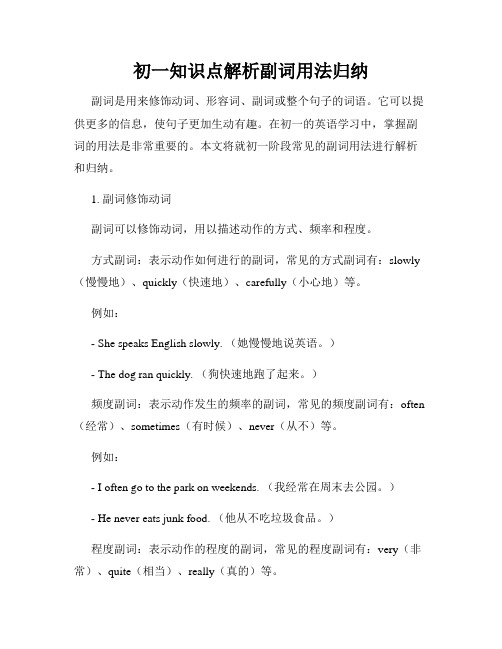
初一知识点解析副词用法归纳副词是用来修饰动词、形容词、副词或整个句子的词语。
它可以提供更多的信息,使句子更加生动有趣。
在初一的英语学习中,掌握副词的用法是非常重要的。
本文将就初一阶段常见的副词用法进行解析和归纳。
1. 副词修饰动词副词可以修饰动词,用以描述动作的方式、频率和程度。
方式副词:表示动作如何进行的副词,常见的方式副词有:slowly (慢慢地)、quickly(快速地)、carefully(小心地)等。
例如:- She speaks English slowly. (她慢慢地说英语。
)- The dog ran quickly. (狗快速地跑了起来。
)频度副词:表示动作发生的频率的副词,常见的频度副词有:often (经常)、sometimes(有时候)、never(从不)等。
例如:- I often go to the park on weekends. (我经常在周末去公园。
)- He never eats junk food. (他从不吃垃圾食品。
)程度副词:表示动作的程度的副词,常见的程度副词有:very(非常)、quite(相当)、really(真的)等。
例如:- The movie was very interesting. (这部电影非常有趣。
)- She is quite tall. (她相当高。
)2. 副词修饰形容词副词也可以修饰形容词,用以加强或减弱形容词的程度。
例如:- Emma is extremely beautiful. (艾玛非常漂亮。
)- The weather is quite cold today. (今天天气相当冷。
)3. 副词修饰副词副词还可以修饰副词,用以表示程度或方式。
例如:- She sings very well. (她唱得非常好。
)- He dances gracefully. (他跳舞优雅。
)4. 副词修饰整个句子副词有时也可以修饰整个句子,用以表示说话者的观点、态度和希望等。
初一重要知识归纳常见副词的用法总结

初一重要知识归纳常见副词的用法总结在初一学习的过程中,学生需要掌握并熟练运用副词,以便更好地表达自己的意思。
以下是一些常见的副词及其用法总结。
1. 时间副词- 常用的时间副词有"常常"、"经常"、"有时"、"偶尔"等。
用于描述动作或状态发生的频率和规律。
- 例如:"他常常去图书馆自习","我们有时一起打篮球"。
2. 程度副词- 程度副词用于描述动词或形容词的程度,表示强弱、大小、程度等。
- 常见的程度副词有"很"、"非常"、"非常"、"太"、"有点儿"等。
- 例如:"这个问题很难","她的英语非常好"。
3. 方式副词- 方式副词用于描述动作的方式或方法。
- 常见的方式副词有"慢慢地"、"快速地"、"轻轻地"、"准确地"等。
- 例如:"他轻轻地打开了门","她准确地回答了问题"。
4. 地点副词- 地点副词用于描述动作发生的地点或位置。
- 常见的地点副词有"这里"、"那里"、"上面"、"下面"等。
- 例如:"书包就在这里","请把杯子放在桌子上面"。
5. 频率副词- 频率副词用于描述动作发生的频率。
- 常见的频率副词有"总是"、"从不"、"经常"、"很少"等。
- 例如:"他总是按时完成作业","他很少迟到"。
副词(完整归纳)

1 词类:副词副词: (ADVERBS)按意义来分,副词可分为情状副词 、程度副词 、地点副词 、时间副词、方式副词、频率副词 、肯定否定副词 。
肯定否定副词 :表示肯定/否定意义。
地点副词:表示地方或/方向。
时间副词:表示时间/期间。
程度副词 :表示动词/形容词/其他副词的程度。
情状副词:表示状态/性质/方式,一般由形容词+ly 构成。
频率副词 :是表示与次数/频率有关的副词。
方式副词 :表示”怎样地”.1 肯定否定副词2 程度副词3 地点副词7 时间副词 hard/well/fast/slowly/excitedly/really always/often/frequently/seldom/never 6 按用法来分,副词可分为简单副词 、复合副词和派生副词。
简单副词:即单个单词使用的副词。
派生副词:形容词+ly. 复合副词:有两部分单词组成的副词简单副词 enough/just/near/very/well 复合副词 Nowhere/therefore 派生副词 obviously/curiously/skilledly 按功用来分,副词可分为句子副词 、连接副词 、解释副词 、关系副词、疑问副词、缩合连接副词和感叹副词。
句子副词:修饰整个句子的副词 . 连接副词:用来连接句子的副词 . 解释副词:用来举例或列举的副词 .缩合连接副词:由先行册和关系副词缩合而成的副词 . 感叹副词:略。
关系副词 :兼有副词与连词两种作用,主要修饰句子。
疑问副词: 问何时、何地、如何、因何的副词。
1 句子副词 surprisingly/worse still/actually2 疑问副词 when/where/why/how3 连接副词 therefore/accordingly/besides/then/moreover/however/nevertheless/otherwise /lastly4 解释副词 e.g.(=for example) i.e.(=that is)5 感叹副词 how6 关系副词 when/where/why7 缩合连接副词 when(=the time when) where(=the place where) why(=the reason why)一、副词的多样性 :1.在词义上,有些副词本身含有实义 , 而有些则知识为了强调 :例:The fire suddenly broke out on the 11th floor. 第 12 层楼突然起火。
初中英语知识点归纳常见的副词短语用法总结
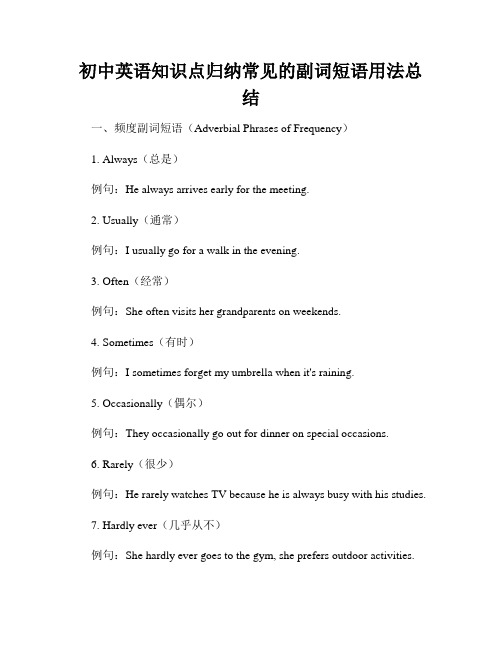
初中英语知识点归纳常见的副词短语用法总结一、频度副词短语(Adverbial Phrases of Frequency)1. Always(总是)例句:He always arrives early for the meeting.2. Usually(通常)例句:I usually go for a walk in the evening.3. Often(经常)例句:She often visits her grandparents on weekends.4. Sometimes(有时)例句:I sometimes forget my umbrella when it's raining.5. Occasionally(偶尔)例句:They occasionally go out for dinner on special occasions.6. Rarely(很少)例句:He rarely watches TV because he is always busy with his studies.7. Hardly ever(几乎从不)例句:She hardly ever goes to the gym, she prefers outdoor activities.8. Never(从不)例句:They never miss a chance to travel during summer vacation.二、时间副词短语(Adverbial Phrases of Time)1. In the morning/afternoon/evening(在早晨/下午/晚上)例句:I exercise in the morning before going to work.2. On weekdays/weekends(在工作日/周末)例句:I have to work on weekdays but I relax on weekends.3. At night(在晚上)例句:They like to stargaze at night in their backyard.4. By the end of(到...结束)例句:She will finish her project by the end of next week.5. In the meantime(与此同时)例句:While waiting for the bus, he read a book in the meantime.6. At the same time(同时)例句:They arrived at the party at the same time.7. From time to time(时常)例句:He visits his grandparents from time to time.8. All day/night long(整天/整晚)例句:They were dancing all night long at the party.三、地点副词短语(Adverbial Phrases of Place)1. In the park(在公园)例句:They often have picnics in the park on weekends.2. At school(在学校)例句:I met my friends at school during lunch break.3. On the beach(在海滩)例句:They love swimming and sunbathing on the beach.4. In the city/countryside(在城市/农村)例句:She enjoys the tranquility of living in the countryside.5. At home(在家)例句:He spends most of his weekends at home with his family. 6. On the way(在路上)例句:They had a great conversation on the way to the airport. 7. Across the road(在马路对面)例句:The supermarket is just across the road, it's very convenient.四、方式副词短语(Adverbial Phrases of Manner)1. In a hurry(匆忙地)例句:She left the house in a hurry because she was late for work.2. With pleasure(乐意地)例句:I will help you move next week, with pleasure.3. In a loud voice(大声地)例句:He shouted in a loud voice to get the attention of the audience.4. On purpose(故意地)例句:He spilled the drink on purpose to annoy his sister.5. By accident(偶然地)例句:I found this lost wallet by accident while walking in the park.6. In a funny way(滑稽地)例句:He imitates his teacher in a funny way and makes everyone laugh.7. In a serious manner(严肃地)例句:The teacher spoke to the students in a serious manner about their behavior.总结:副词短语在英语中起到修饰动词、形容词、副词和整个句子的作用,能够更准确地表达出时间、地点、方式和频率等信息。
初中的解析常见副词的用法归纳与解析
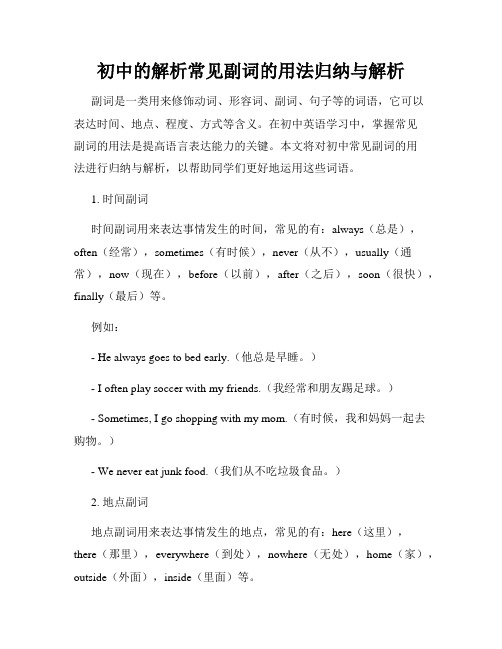
初中的解析常见副词的用法归纳与解析副词是一类用来修饰动词、形容词、副词、句子等的词语,它可以表达时间、地点、程度、方式等含义。
在初中英语学习中,掌握常见副词的用法是提高语言表达能力的关键。
本文将对初中常见副词的用法进行归纳与解析,以帮助同学们更好地运用这些词语。
1. 时间副词时间副词用来表达事情发生的时间,常见的有:always(总是),often(经常),sometimes(有时候),never(从不),usually(通常),now(现在),before(以前),after(之后),soon(很快),finally(最后)等。
例如:- He always goes to bed early.(他总是早睡。
)- I often play soccer with my friends.(我经常和朋友踢足球。
)- Sometimes, I go shopping with my mom.(有时候,我和妈妈一起去购物。
)- We never eat junk food.(我们从不吃垃圾食品。
)2. 地点副词地点副词用来表达事情发生的地点,常见的有:here(这里),there(那里),everywhere(到处),nowhere(无处),home(家),outside(外面),inside(里面)等。
例如:- I left my bag here.(我把书包放在这里了。
)- The park is over there.(公园在那边。
)- Our class went on an outing everywhere last weekend.(上周末,我们班到处去郊游了。
)- The cat is nowhere to be found.(猫不见了,无处找到。
)3. 程度副词程度副词用来表达事情发生的程度或程度的变化,常见的有:very (非常),quite(相当),too(太),so(如此),enough(足够),almost(几乎),hard(努力地),well(好),badly(糟糕地)等。
副词归纳

一.副词的定义副词是用来修饰动词,形容词,其他副词或全句的词,用来说明时间,地点,程度和方式等。
按意义分类:时间副词:today,now(现在),sometimes(有时),then(然后)地点副词:here,there,everywhere(到处)程度副词:too(太),much(很多),quite(十分),enough(充足地)方式副词:slowly(慢地),badly(严重地),suddendly(突然地)疑问副词:how,when,where,why(为什么)二.副词的位置㈠副词修饰动词时,通常放在被修饰动词的后面。
He works hard.他努力工作。
She is smiling now.她正在笑。
㈡副词修饰形容词时,通常放在被修饰副词的前面。
The music is too(副词) loud(形容词.)It is very funny dog.它是一只非常有趣的狗。
㈢副词修饰其他副词的时候,通常放在被修饰副词的前面。
He plays quite(副词) well(副词).他表现得相当好。
三.副词的比较等级副词也有原级,比较级和最高级,它的变化形式与形容词基本上一样㈠副词比较级规则变化①单音节词和少数双音节词,比较级在词尾加-er,如fast →faster,hard →harder②以e结尾的单音节词,,比较级在词尾加-r,如late →later③两个或两个以上音节的词,比较级在词前加more如:easily(容易地)→more easily quickly(快地)→more quickly㈡副词比较级不规则变化well →better much →more badly →worselittle →less far →father/further四.副词原级及比较级的用法as +副词原级+as 表示”```` 和``````一样”Lily studies as hard as Mary.莉莉和玛丽一样刻苦努力。
英语副词用法归纳大全

英语副词用法归纳大全嘿,同学们!咱们今天来好好聊聊英语里的副词那些事儿。
先来说说啥是副词哈。
副词啊,就像是给句子调味的小佐料,能让句子变得更有味道、更生动。
比如说,“He runs fast” 这里的“fast”就是个副词,它让我们知道他跑的速度咋样。
那副词都有啥类型呢?有表示时间的,像“yesterday”(昨天)、“now”(现在);有表示地点的,像“here”(这儿)、“there”(那儿);还有表示程度的,比如“very”(非常)、“quite”(相当)等等。
咱们先来讲讲表示时间的副词。
我记得有一次,我在公园里散步,突然听到有人喊:“Tomorrow is another day!” (明天又是新的一天!)这“tomorrow”就是个表示未来时间的副词。
还有像“I got up early this morning” 这里的“early”就是表示具体某个早上的时间状态。
再说说表示地点的副词。
有一次我去商场,听到广播里说:“Please come here quickly” (请快点到这儿来。
)这里的“here”就是告诉大家地点。
表示程度的副词也很有趣。
比如有个同学跟我说:“The movie is very interesting” 这里的“very”就强调了“有趣”的程度。
副词在句子中的位置也有讲究哦。
一般来说,它可以放在句首、句中或者句尾。
比如说,“Fortunately, I passed the exam” (幸运的是,我通过了考试。
)“fortunately”这个副词就放在了句首。
还有哦,副词可以用来修饰动词、形容词和其他副词。
像“She sings beautifully” (她唱得动听。
)“beautifully”就修饰了动词“sings”。
咱们在使用副词的时候,要注意别用错啦。
我就曾经看到过一个句子写成“She very likes apples” 这可就错啦,应该是“She likes apples very much”好啦,同学们,关于英语副词的用法,咱们今天就先说到这儿。
副词用法归纳

副词用法归纳副词作为英语语法的一个重要组成部分,具有丰富的用法。
下面将从不同的角度对副词的常见用法进行归纳,以帮助读者更好地理解和运用副词。
一、副词修饰动词副词能够修饰动词,可以表达动作的方式、状态或程度。
例如:1. 方式副词:她轻轻地走进房间。
在这个例子中,“轻轻地”修饰动词“走”,表示她的动作方式是轻盈、谨慎的。
2. 状态副词:他显然很紧张。
在这个例子中,“显然”修饰动词“很紧张”,表达了主观的判断和观察,表示他表现出明显的紧张状态。
3. 程度副词:他非常努力地学习。
在这个例子中,“非常”修饰动词“学习”,表示程度上的强调,表达了他学习非常刻苦、认真。
二、副词修饰形容词和副词副词还可以修饰形容词和其他副词,进一步强调其程度或方式。
1. 形容词:这首歌曲非常好听。
在这个例子中,“非常”修饰形容词“好听”,表示程度上的强调,表达了对歌曲的高度赞美。
2. 副词:他跑得非常快。
在这个例子中,“非常”修饰副词“快”,强调他以非常快的速度跑。
三、副词修饰句子副词还可以修饰整个句子,表达说话人的观点、态度或者提出一种条件或假设。
1. 观点/态度副词:幸运地,我们顺利通过考试。
在这个例子中,“幸运地”修饰整个句子,表达说话人对通过考试这一结果的幸运和庆幸之情。
2. 条件/假设副词:也许他会来参加派对。
在这个例子中,“也许”修饰整个句子,表示说话人对他参加派对的条件或假设。
四、副词的位置在句子中,副词的位置可以是句首、句中或句末,根据不同的副词和句子结构可以选择合适的位置。
1. 句首:频繁地,他去了图书馆。
在这个例子中,“频繁地”放在句首,强调的是动作的频繁性。
2. 句中:他每天都认真地学习。
在这个例子中,“认真地”放在句中,修饰动词“学习”,表达的是他认真学习的方式。
3. 句末:他唱得很好。
在这个例子中,“很好”放在句末,修饰动词“唱”,表示对他唱得好的评价。
综上所述,副词是英语中一个重要的的语法部分,它可以修饰动词、形容词、副词,也可以修饰句子。
副词用法归纳

副词用法归纳副词是一类用来修饰动词、形容词和其他副词的词性。
在句子中,副词可以起到修饰、限定、加强等作用,用来描述动作的方式、程度、时间、地点等,并且可以改变句子的语气和意义。
下面将详细介绍副词的用法。
一、副词的修饰动作的方式1. 描述动作的方式:副词可以用来描述动作是如何进行的。
例如:"他慢慢地走过去"中的"慢慢地"修饰了动作"走过去",表示动作进行得缓慢、轻柔。
2. 描述动作的态度或情感:副词可以用来描述说话人对动作的态度或情感。
例如:"她不情愿地离开了"中的"不情愿地"表示说话人对她的离开持有反对或不满的态度。
二、副词的修饰形容词和副词副词可以用来修饰形容词或副词,来表达一些程度上的变化。
例如:"他非常高兴"中的"非常"修饰了形容词"高兴",表示程度上的强调。
三、副词的修饰句子、短语和其他副词1. 修饰整个句子:副词可以用来修饰整个句子,表示说话人对整个句子所表达的内容的态度或观点。
例如:"幸运地,我们赶上了最后一班车"中的"幸运地"修饰整个句子,表示说话人认为这是一种幸运的情况。
2. 修饰短语:副词可以用来修饰短语,表示在某一特定的情况下某一行为或状态出现得怎样。
例如:"他们快乐地唱着歌"中的"快乐地"修饰短语"唱着歌",表示他们在唱歌时感到很快乐。
3. 修饰其他副词:副词可以用来修饰其他副词,表示程度上的变化或强调。
例如:"他非常非常地努力工作"中的"非常非常地"修饰了副词"努力",表示程度上非常地努力。
四、副词的用法注意事项1. 副词的位置:一般情况下,副词位于动词之后,形容词和其他副词之前。
小学的归纳与解析常见副词的用法和修饰规则

小学的归纳与解析常见副词的用法和修饰规则在小学阶段,学生们开始接触并学习语法知识,其中副词的使用和修饰规则成为重要的学习内容。
副词是一种词类,在句子中常常用来修饰动词、形容词或其他副词,用以提供更多的细节和描述。
本文将归纳和解析小学阶段常见副词的用法和修饰规则。
一、时间副词时间副词用来表达动作或事件发生的时间,其中常见的有“今天”、“明天”、“以前”、“以后”等。
这些副词可以在句子中修饰动词,例如,“明天我要去图书馆看书。
”时间副词也可以修饰整个句子,例如,“今天下雨,我们不能去公园玩。
”二、地点副词地点副词用来表示事物所在的地点,其中常见的有“这里”、“那里”、“上面”、“下面”等。
这些副词可以修饰动词或介词短语,例如,“我在这里等你。
”地点副词还可以与动词连用构成短语动词,例如,“他拿起书走进了教室。
”三、方式副词方式副词用来表示动作或事件发生的方式,常见的有“慢慢地”、“好好地”、“高兴地”等。
这些副词可以修饰动词,描述动作进行的方式,例如,“她慢慢地走进了房间。
”方式副词也可以修饰整个句子,在句子前面或后面起到补充说明的作用,例如,“用心倾听,你就可以更好地理解。
”四、程度副词程度副词用来表示事物的程度或程度高低的比较,其中常见的有“非常”、“很”、“更”等。
这些副词可以修饰形容词或副词,用来加强或减弱描述的程度,例如,“这个问题非常重要。
”程度副词也可以修饰动词,表示动作的程度,例如,“他跑得更快了。
”五、频率副词频率副词用来表示动作或事件发生的频率,其中常见的有“经常”、“有时候”、“从不”等。
这些副词可以修饰动词,表示动作发生的频率,例如,“我经常看电视。
”频率副词也可以修饰整个句子,在句子前面或后面表示总体情况,例如,“经常锻炼身体对于健康非常重要。
”六、原因副词原因副词用来表示事物发生的原因,其中常见的有“因为”、“所以”、“由于”等。
这些副词可以连接句子,表示因果关系,例如,“因为雨下得太大,所以他没有出门。
- 1、下载文档前请自行甄别文档内容的完整性,平台不提供额外的编辑、内容补充、找答案等附加服务。
- 2、"仅部分预览"的文档,不可在线预览部分如存在完整性等问题,可反馈申请退款(可完整预览的文档不适用该条件!)。
- 3、如文档侵犯您的权益,请联系客服反馈,我们会尽快为您处理(人工客服工作时间:9:00-18:30)。
副词用法归纳Feb 23, 2011副词的定义: 副词是一种用来修饰动词 ,形容词,副词或全句的词 ,说明时间,地点,程度,方式等概念。
一)副词的分类 :1)时间和频度副词 :now, then, often, always, usually, early, today, lately, next, last, already, generally, frequently, seldom, ever, never, yet, s o o n, too, immediately, hardly, finally, shortly, before, ag o,sometimes, yesterday.2)地点副词 :here, there, everywhere, anywhere, in, out, inside, outside, above, below, down, back, forward, home, upstairs, downstairs, across, along, round , around, near, off, past, up, away, on.3)方式副词 :carefully, properly, anxiously, su d d enly, normally, fast, well, calmly, politely, proudly, softly,warmly4)程度副词 :m u c h,li t le, very, rather, so, t o o , still, quite, perfectly, e n o u g h,extremely, entirely, almost, slightly.5)疑问副词 :how, when, where, why.6)关系副词 :when, where, why.7)连接副词 :how, when, where, why, whether.二)副词的用法 : 副词在句中可作状语 ,表语,补语。
He works hard.他工作努力。
Youspeak Englishquite well.你英语讲的很好。
Is she in ?她在家吗?Let's be o ut.让我们出去吧。
Food here is hard to get.这儿很难弄到食物。
We went to her house but we found her out. 我们到她家里去,发现她不在家。
I want it back right now.我要马上把它还给我。
三)副词的位置 :1)多数副词都可以放在动词的后面,如果动词带有宾语,副词就放在宾语后面。
I get up early in the morning everyday.我每天早早起床。
He gave m e a giftyesterday.他昨天给了我一件礼物。
She didn't drink water enough.她没喝够水。
The train goes f ast.火车跑得快。
We cango to this sch o o l fr e e ly.我们可以免费到这家学校学习。
They left a life hardly t hen.当时他们的生活很艰难。
He has a new cat ontoday.他今天戴了一顶新帽子。
I have seen this film twice with my friends. 这部电影我和朋友看过两次。
2)程度副词一般放在它所修饰的词前面。
It's rather easy, I can do it.这很容易,我能做到。
Hedid it quite well.他做得相当好。
It's rather difficult to tell who is right.很难说谁是对的。
It's so important that I must tell my friends.这件事太重要了,我得告诉我的朋友。
It's muchbe t er. 好多了。
注意;enough 放在它所修饰的形容词和副词的后面。
Youcannever be careful e n o u g h.Grandma was able to run fast enough to catch up with the child.3)频度副词可放在实义动词的前面,助动词的后面,如果有多个助动词,放在第一个助动词后面。
I often help him these days.这些日子我经常帮助他。
I always remember the day when I first cameto this school.我常常记得我第一次来学校的那一天。
Youmustn't always help me.你不能老是帮助我。
He seldom comes to see us.他很少来看我们。
We usually go shopping once a week.我们通常一周买一次东西。
The new students don't always go to dance.新学生并不时常去跳舞。
You must not always be translating everything into Chinese.你不要把什么都翻译成汉语。
I shall never be afraid of any difficulties.我将不怕任何困难。
4)有些副词常放句首。
如:now, today, certainly, fortunately…Now he is attending Tangshan No. 1 High School.Certainly I will come on time.Fortunately, Lincoln’s step mother was kind to him.5)时间副词和地点副词在一个句中, 地点副词在前面时间副词在后面。
We w ent s hoppinginthe s upermarket a t 9o'clock yesterday.昨天九点钟我们到超市买东西了 .What were you doing in the classroom yesterday evening?昨天下午你在教室里干什么?The accident took place one hour ago in the Eleven Avenue.一小时前十一号大街发生了一场事故。
四)副词的比较级和最高级 :副词和形容词一样,也有它的比较级和最高级形式. 可以参考形容词的变换形式。
但以词尾-ly 结尾的副词(除early )须用 more 和 most 。
hard harder hardestfast faster fastestearly earlier earliestmuch more mostwarmly more warmly most warmly1)单音节副词的比较级是在副词后面加上-er 构成的,最高级是在副词后面加上-est 构成的。
near nearer nearesthard harder h ardest2)多音节副词的比较级是在副词的前面加上-more 构成的。
最高级是在副词前面加上-m o s t 构成的。
warmly more warmly most warmlysuccessfully more successfully most successfully3)有些副词的比较级和最高级形式是不规则的。
well- better – best little - less - leastmuch - m ore - most badly - worse - worstfar – farther ( further)– farthest ( furthest )不同的是最高级形式句中 the 4)副词的比较级和最高级用法同形容词的比较级用法基本一样。
可以省略。
He works harder than I.他比我工作努力。
Lucy gets up earlier than Lili.露西比丽丽起床早。
He runs fastest in our class.他在我们班跑地最快。
He dives deeper than his teammates.他比他的队员潜水深。
It's true that he speaks English more fluently than any of us. 他英语讲的确实比我们任何人都好。
Our school team plays football best in our region.我们校队在我们地区足球踢得最好的。
五.副词的其他重要用法1)much too 太;too much 太多He is much too fat.He eats too much meat every day.2)可以放在 t o o前的词:m u c h, far, rather, alot, a bit , a li t le You hair is far too long. Go and have it cut.The trousers are a lot too long.The sweater is a bit / a little too long. 羊毛衫有点短。
3)this / that = s oI can’t jump that h igh.4)well 非常,在很大程度上I know him w ell.It’s well worth doing.He is well over forty.5)how / too / as / so + adj. + a …How clever a boy!This is too hard a task for a child.Tomis as clever a boy as Jim.Tomis not so clever a boy as Peter.6)can not … too…; can not … enough 怎么… 也不为过Youcannever be too careful.Youcannever be careful e n o u g h.I can’t thank you too much.I can’t thank you enough.7)两种形式的副词。
如:deep 深 -- deeply 深深地high 高 -- highly 高度地wide 宽 -- widely 广泛地close 靠近--- closely 仔细地late 晚--- lately 最近most pron. 大多数 --- mostly 大多数;大多数情况下He studied deep into t he night. 他学习到深夜。
